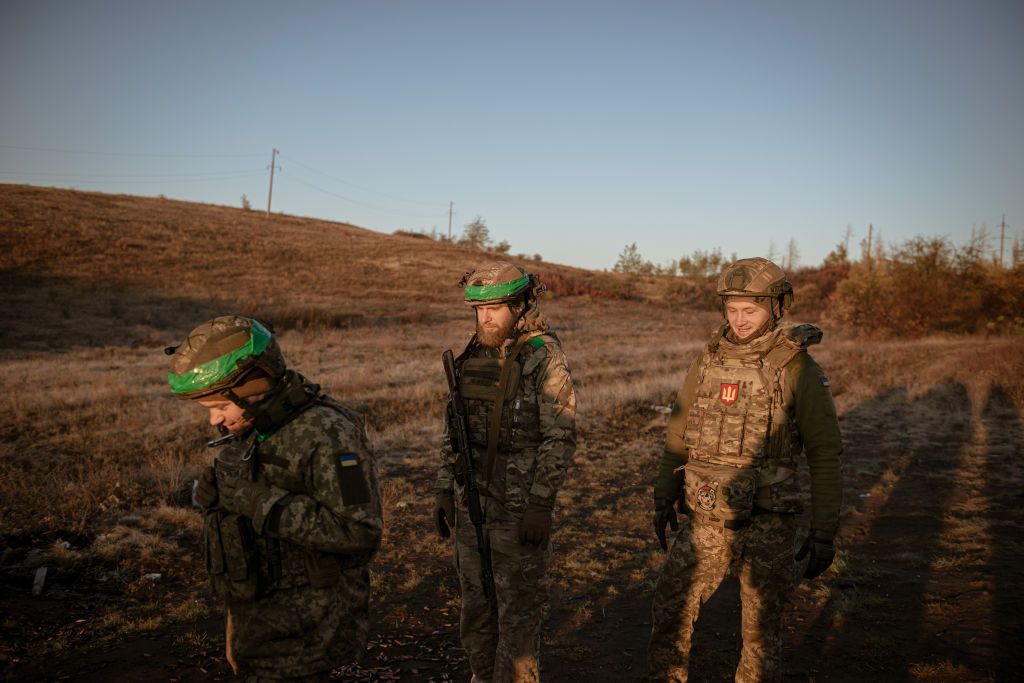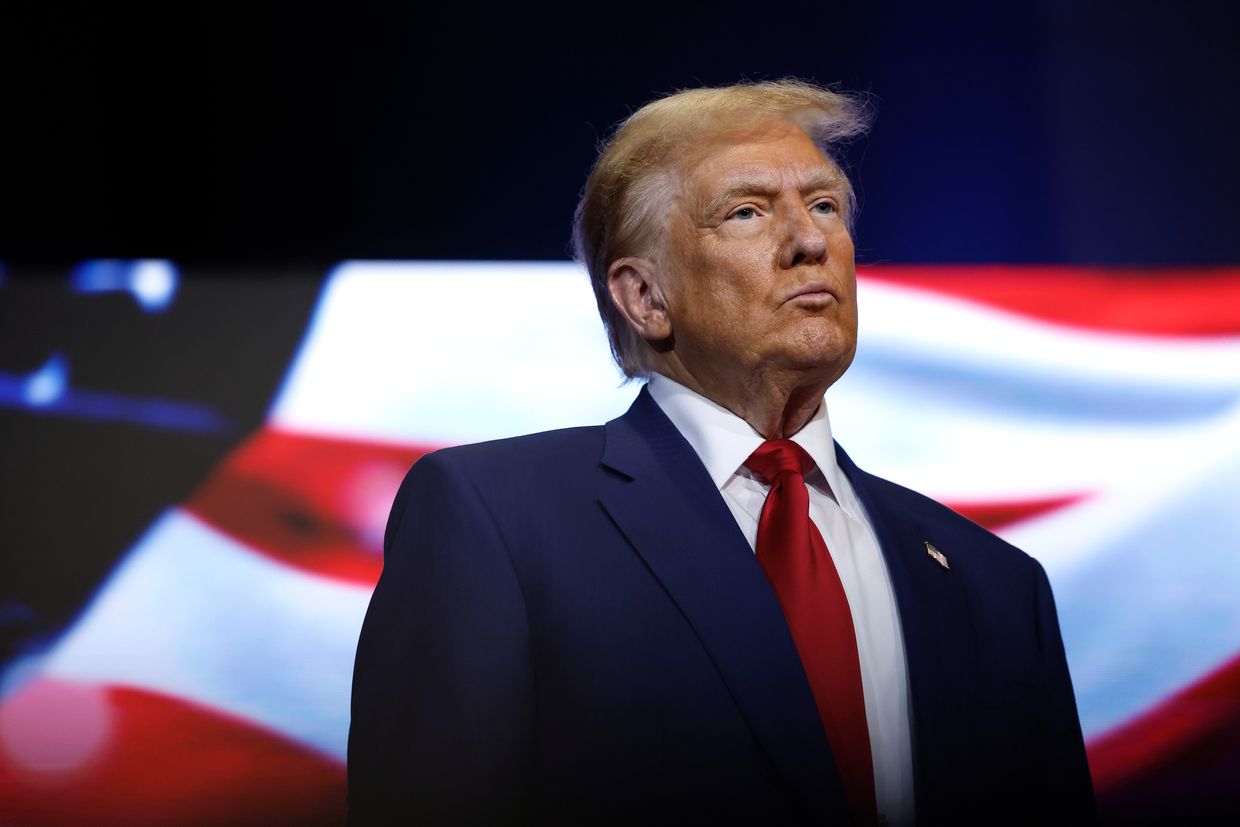Trump to call Putin, seek quick deal to end Russia-Ukraine war, says Volker
The former US negotiator on the Russia-Ukraine conflict says Trump wants the war over before taking office, success hangs on being tough on Putin who will have demands.

Former U.S. ambassador to NATO Kurt Volker speaking at the Globsec conference in Prague, Czechia, on Aug. 31, 2024. (Ray Baseley/the Kyiv Independent)
Donald Trump won the U.S. presidential election on Nov. 6, after months of repeatedly claiming he could end Russia's full-scale invasion of Ukraine in a day.
To do that, he will have to do what he claims he does best — negotiate a deal.
Ambassador Kurt Volker is one person with a wealth of experience in issues Trump is likely to face regarding Russia’s war against Ukraine.
Volker served as the U.S. special representative for Ukraine negotiations in 2017-2019, during Trump’s previous tenure. In this role, he held negotiations between Kyiv and senior members of Russian President Vladimir Putin’s administration as an intermediary while coordinating with European allies on efforts to end Russia’s initial invasion of the eastern Donbas region in 2014, following its occupation of Ukraine’s Crimean Peninsula earlier that year.
Before this, Volker served as U.S. ambassador to the NATO military alliance in 2008-2009.
The Kyiv Independent spoke to Volker via video call a few hours after the election result was called to ask how he sees outgoing U.S. President Joe Biden's last months in office, Trump's return to the presidency, and what it could mean for Ukraine.
This interview has been edited for length and clarity.
The Kyiv Independent: In terms of Ukraine, there's been a lot already said about what Trump might do once he's in office, but we still have more than two months of the Biden administration. Do you think we can expect anything surprising from Biden before he leaves office?
Kurt Volker: There has been some discussion that I've heard within the administration about the idea of making a gesture in the direction of Ukraine's NATO membership, or also about approving the use of long-range weapons (to strike deep inside Russia), something that the Biden administration has denied until now.
On NATO membership, we have to be very, very careful. You don't want to put that out prematurely. You don't want it to be uncoordinated with allies. We had an opportunity to do this leading up to the Washington summit this summer, and we didn't do it. So to bring it up in the last moments of the Biden administration now does not seem to be the wisest choice. It needs to be better coordinated.
On the use of weapons, however, I think the Biden administration would be very well advised simply to just drop its objections. Just let Ukraine use the weapons we've given them. And this can be done quietly, it doesn't have to be a big announcement. It can be done on a case-by-case basis, if the Biden administration insists.
But there's no justification for allowing Russia to attack Ukraine from anywhere, and to tell Ukraine that they must not strike back.

The Kyiv Independent: Once Trump does take office, how far up his agenda do you think Ukraine will actually be?
Kurt Volker: I think he's going to make a phone call to Putin as quickly as possible and tell Putin that he needs to stop the war, that the fighting has to stop, and that there has to be peace. And that will start a discussion about how that actually happens. And what I expect to happen is that Putin will have demands.
Putin will say 'I need this, I need this, I need this.' And I think Trump will say 'no, you stop the war.' But I do think it happens quite quickly, I don't think Trump wants to see this war continue once he's actually in office.
The Kyiv Independent: Trump obviously prides himself on being a bit of a dealmaker. How tricky an opponent do you think Putin will be in terms of actually arriving at a deal?
Kurt Volker: I think (Russian President Vladimir) Putin is the most cunning and wily opponent you could possibly have because he has no issues with lying, deceit, cheating, attacking, killing — everything you can imagine. Putin's interest is not a deal. Putin's interest is to take, he wants to take all of Ukraine.
And therefore, if you want to stop the war, if you want peace, as Trump says that he does, then what you need to do is convince Putin that it's going to hurt him, that it's going to cost him too much if he pursues the war. And that's going to require showing much more strength.
And Trump has talked about this. He talks about Biden as being a very weak president.
And the implication is that Trump sees himself as a strong president. And he's going to need to show some strength to Putin in order to get Putin to decide that it's time to end the war.
The Kyiv Independent: Can you elaborate on some possible scenarios for how Trump can show that strength?
Kurt Volker: I think the first thing Trump will do is increase U.S. oil and gas production, to try to flood global markets with as much cheap energy as possible. That'll be good for the U.S. economy, it'll be good for the global economy. It'll also be bad for Putin's budget, and so I think that's one thing that he is almost guaranteed to do.
A second thing I think he will do is reshape the Middle East in the sense that he will take a very tough, direct approach to Iran, try to realign with Saudi Arabia and bring Saudi Arabia and Israel back into a common purpose. It's going to take time, it's going to be very difficult, but that will make a difference, and it will show a different way of dealing with the world to both Putin and (Chinese President Xi Jinping), compared to what we've seen until now.
And then, when it comes to Ukraine itself, I think he's going to seek support for a lend-lease program, letting Ukraine borrow money in order to buy American weapons. It's something that was on the books for two years and never used during the Biden administration.
I don't think Trump wants to spend American taxpayers' money on Ukraine, but to allow Ukraine to borrow what it needs to defend itself. I think he would be inclined to do it. And if you make it big enough, if you make it, say, $500 billion, a huge number, that should be enough to tell Putin he can't outspend this, he can't win this, and that could also point the way towards a settlement.
The Kyiv Independent: If Trump proved anything during his last term in office, it was that he was quite unpredictable. Are there any curveball scenarios that you can envisage happening?
Kurt Volker: I suppose that's what Putin is thinking about. Can Putin create a curveball scenario? Can he throw something on the table completely unexpected that gets us off track? Maybe Putin will actually come forward with a proposal that is far more reasonable than anything that Putin has proposed until now. Can that distract us? I think that would be the curveball scenario.
The Kyiv Independent: There's a slightly somber mood in Kyiv this morning. Do you think that it's justified, or should Ukrainians be more optimistic?
Ambassador Kurt Volker: Well, I wouldn't say that people should be optimistic or somber. I'd say that people should stay determined. Ukraine is in the fight of its life. It has to win.
It wasn't ideal under the Biden administration, and would not have been under (Kamala) Harris. We saw the U.S. being slow, reactive, not willing to give Ukraine the weapons needed, not willing to give them the authorization to use those weapons — an excessively cautious approach, one that worried too much about escalation, and not really one designed to help Ukraine win.
What I think we have with Trump now is the opportunity to compete, the opportunity to see whether we can get a stronger Western position in support of Ukraine that might actually be decisive.
But it's not guaranteed. With Harris, we knew where we were going. With Trump, I think we don't know, but we can compete for it.













